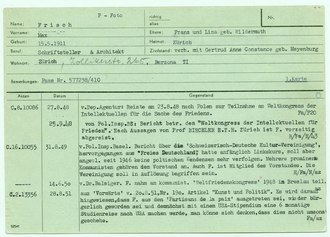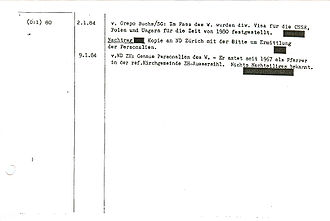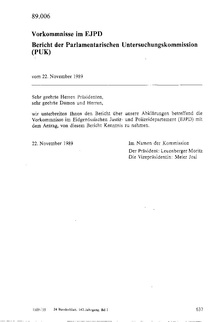Fishing scandal


The so-called secret files scandal (also Fichenaffäre ) is a scandal of recent Swiss history in the final stages of the Cold War . Derived from this, the word “Fichenstaat” was formed in Switzerland as a paraphrase for a “sniffing state”. Around 900,000 state security files were created between 1900 and 1990 and are now in the Federal Archives .
procedure
To investigate the so-called “ Kopp case ”, the federal parliament decided on January 31, 1989 to set up a parliamentary commission of inquiry (PUK) chaired by the then National Council and later Federal Councilor Moritz Leuenberger . The order also included a detailed investigation of the data collection activities carried out by the Federal Prosecutor's Office for the purpose of state security by means of so-called "fiches" (tabs), for which the regular Audit Commission (GPK) did not have sufficient powers, although it had the existence and number of these since May 1988 Fichen was informed.

In the late 1980s it gradually came to light that the federal authorities and also the cantonal police authorities had set up around 900,000 files since 1900. According to the official archives, more than 700,000 people and organizations were recorded. The observation activities first caught foreign anarchists , Swiss socialists and trade unionists, unwelcome political refugees and expelled foreigners. Some dossiers from the 1930s and 1940s deal with National Socialists and fascist movements. With the rise of anti-communism , left-wing politicians and members of trade unions in particular were monitored. The official aim of the fiche was to protect the country from foreign controlled subversive activities to destabilize the system and the subsequent establishment of a totalitarian ( communist ) dictatorship .
As the predecessor of this state surveillance activity, the Zurich FDP politician Ernst Cincera had created his own card index, which could be consulted by private parties, for example in connection with job applications.

The exposure of the fishing scandal with the report in November 1989 moved the Swiss public strongly. Many citizens' confidence in the state was shaken. Numerous citizens submitted requests to have their personal files released. They finally received copies of their files on which the names of third parties were covered in order to keep the identity of the informants secret. On March 3, 1990, 30,000 people demonstrated in Bern.
Combating subversion was a popular catchphrase during the Cold War . The PUK revealed how broadly this vague term was understood. As emerged from the documents of the Intelligence Service and Defense Subgroup (UNA), zealous state protectors perceived the “left”, “alternative”, “greens”, peace movements, third world activists, women's movements, foreign workers, anti-nuclear movements and religious groups as potentially dangerous because they could be infiltrated, enemy-controlled or manipulated. Above all, the entries in the fiche turned out to be “partly extremely unsystematic and random” (PUK) because the officers lacked a uniform threat image and there were no specific instructions about the fulfillment of this delicate preventive state protection mandate.
In connection with the research into the Kopp and Fichen affair, indications of other abnormalities were found. A report was drawn up about the secret organizations P-26 and P-27, the content of which has been withheld from the public until today. There are still uncertainties regarding the registration of " gypsies ". The fact that a corresponding archive was created is no longer denied today. However, since all research by historians (e.g. within the framework of the so-called Bergier Commission , the independent commission of experts that processed the history of Switzerland during the Second World War ) has only been able to uncover individual documents in scattered archives and the authorities have come to this If you do not mention the topic, it remains unclear whether this registry has been destroyed or is still in use.
literature
- Switzerland. Parliamentary Commission of Inquiry (FDJP): Report of the Parliamentary Commission of Inquiry (PUK) of November 22, 1989: Incidents in the FDJP. (PDF) Bern 1989.
- Switzerland. Parliamentary Commission of Inquiry (FDJP): Supplementary report of the Parliamentary Commission of Inquiry (PUK) of May 29, 1990: Incidents in the FDJP. (PDF) Bern 1990.
- Urs Paul Engeler : Big Brother Switzerland. How wild democrats became monitored citizens. The story of the political police. Weltwoche-ABC-Verlag, Zurich 1990, ISBN 3-85504-128-8 .
- Jürg Frischknecht , Liliane Studer (Red.): Sniffing State of Switzerland. A hundred years is enough. Issued by the End the Sniffing State Committee. Limmat-Verlag, Zurich 1990, ISBN 3-85791-170-0 .
- Georg Sonderegger , Christian Dütschler : A PUK report shakes Switzerland. The fishing scandal. In: Heinz Looser, Christian Kolbe, Roland Schaller, Sandra Brutschin, Gregor Sonderegger, Christian Dütschler, Simona Gambini (eds.): Switzerland and its scandals. Limmat-Verlag, Zurich 1995, ISBN 3-85791-236-7 , 209-218.
- Thomas Huonker , Regula Ludi : Roma, Sinti and Yeniche. Swiss gypsy policy at the time of National Socialism. Contribution to research (= publications of the Independent Expert Commission Switzerland - Second World War. Vol. 23). Published by the Independent Expert Commission Switzerland - Second World War. Chronos-Verlag, Zurich 2001, ISBN 3-0340-0623-3 ( unchanged edition of the published supplement to the 1999 refugee report ).
- Georg Kreis among others: State protection in Switzerland. The development from 1935–1990. A multidisciplinary investigation commissioned by the Swiss Federal Council. Paul Haupt Publishing House, Bern 1993.
- Georg Kreis: State Security. In: Historical Lexicon of Switzerland .
- Max Frisch : Ignorance as state security? , written 1990, ed. by David Gugerli and Hannes Mangold, Suhrkamp, Berlin 2015, ISBN 978-3-518-42490-2 ; Excerpts under the title The F files - Max Frisch on his fiche and Swiss state security. In: NZZ history. (Magazin), No. 3, October 2015, with commentary by David Gugerli and Hannes Mangold.
- Daniel de Roulet : Double. A report (1998) about Peter Gasser, a victim of the Fichenskandal
- Peter Gross describes in the book “once Ku'damm and back”, Berlin 2016 ISBN 978-3-7418-3926-9, how he became a victim of the Fichenskandal.
Web links
- Fichenskandal - a sound journey - Radio SRF 4 News
- Roman Bucheli: The strange legacy of the state security. Twenty years ago the Fichen affair shook the Swiss public - forays into a curious archive. In: Neue Zürcher Zeitung from July 13, 2009.
- Marc Tribelhorn: The voracious state In: Neue Zürcher Zeitung from November 22, 2014.
- Raphael Zehnder: Fichenskandal: When parents spied on their children. Interview with Moritz Leuenberger . SRF, November 21, 2014.
- Holdings: Archive of the Sniffer State of Switzerland (ASS) in the finding aids of the Swiss Social Archives
- Peter Gross describes on his website with two original documents how he was spied on for years.
Individual evidence
- ↑ Page no longer available , search in web archives: Staatsschutz Bundesarchiv: Access to archives
- ↑ "They brought our activities closer to the Stasi" , Tagesanzeiger, November 17, 2014.
- ↑ Martin Matter: P-26 - The secret army that wasn't. How politics and the media scandalized the preparation of the resistance. hier + now, Verlag für Kultur und Geschichte, Baden 2012, ISBN 978-3-03919-247-2 , p. 263 f.
- ↑ Table of Contents